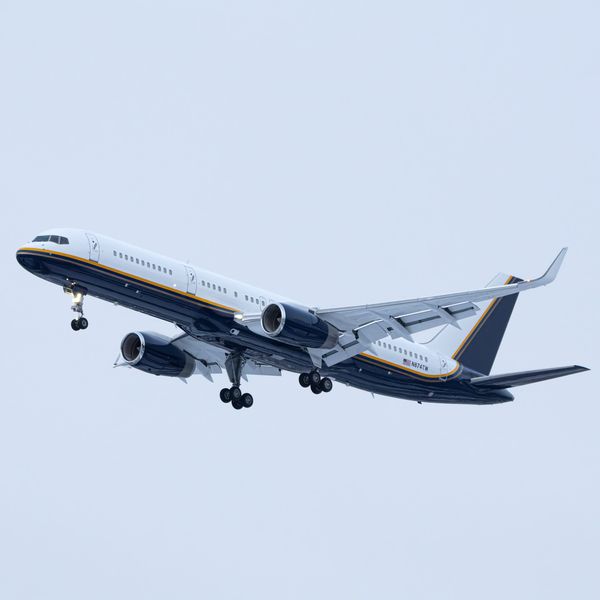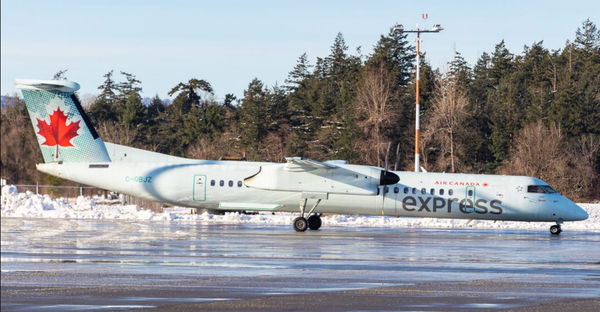The Russian penal system announced that the prominent Russian opposition leader Alexei Navalny died on Friday after prison authorities stated he lost consciousness after a walk.

Pobeda Flight 936
In 2020 Alexei had been in Germany for months, after surviving an almost fatal Novichok nerve agent poisoning while on a flight over Siberia, which he blamed on the Kremlin. His spokeswoman said he might have drank a spiked tea before taking off at Tomsk's Bogashevo Airport (TOF). After his recovery, he decided to return to Russia despite threats and international condemnation, a move widely seen as an act of defiance and a commitment to his anti-corruption campaign.
After his recovery in January 2021, he returned to Russia on a seemingly routine flight from Berlin to Moscow. However, Pobeda Flight 936 (DP 936) ended up landing at Sheremetyevo Airport (SVO) instead of the intended Vnukovo Airport (VKO).
A seemingly minor change marked the beginning of a major event in Russian politics, as one of the Kremlin's biggest critics, Alexei, was detained upon his return. Hundreds of supporters and journalists awaited him at Vnukovo Airport, eager to witness his arrival. However, as the plane was diverted to Sheremetyevo, supposedly due to technical issues, many would soon find out what had happened to him.
.jpeg)
This last-minute change was widely perceived as a deliberate attempt by authorities to minimize media coverage and potential public demonstrations of support. The drama unfolded quickly as immigration officials detained Navalny upon arrival at Sheremetyevo. The officials cited violations of parole terms related to a 2014 embezzlement conviction, a charge he maintained was politically motivated.
The move sparked immediate reactions as Western nations, including the United States and European Union, strongly condemned the arrest, calling it politically motivated and demanding Navalny's immediate release. Protests erupted across Russia, with thousands taking to the streets in various cities, defying harsh penalties for unauthorized demonstrations. The protests showcased the public's support for Navalny and their discontent with the government amid brutal suppression by the authorities.

Aftermath
The following weeks saw a series of legal gimmicks. Navalny was transferred to a detention facility and denied access to his lawyers, raising concerns about fair treatment and due process. A hearing converted his suspended sentence into a 3.5-year prison term, further fueling domestic and international outrage. The decision sparked renewed protests, which were met with brutal crackdowns by Russian security forces as thousands were detained, and some faced criminal charges.
These actions solidified the perception of a government unwilling to tolerate dissent and cracking down on any threat to its power. Navalny's detention and subsequent imprisonment sent shockwaves through Russian politics and beyond as it served as a dark reminder of the challenges faced by opposition figures in the country and the lengths the government goes to suppress dissent.
Internationally, the event further strained relations between Russia and the West, with accusations of human rights violations and calls for international pressure on the Kremlin. Many Western nations imposed sanctions on Russian officials and entities, reflecting their disapproval of the treatment of Navalny and wider concerns about democratic backsliding in Russia.
.jpg)
Alexei Navalny's Death
Alexei Navalny died in the Russian Arctic penal colony where he was serving a 19-year sentence on charges of extremism. Officials stated he collapsed after a walk, and medics could not resuscitate him. Ukraine's President Volodymyr Zelenskyy said: "It is obvious that he was killed by Putin."
U.S. Secretary of State Antony Blinken said:
"His death in a Russian prison and the fixation and fear of one man only underscores the weakness and rot at the heart of the system that Putin has built."
The long-term implications of Navalny's imprisonment and subsequent death are yet to be fully understood. However, it has undoubtedly shaped the political landscape of Russia, highlighting the ongoing struggle between democracy and authoritarianism in the country. Whether it fuels further resistance or serves as a warning to potential dissidents remains to be seen.
U.S. Carriers Sound Alarm Over Dublin’s ‘Passenger Cap’ and Transatlantic Disruption » Saudi LCC Flyadeal Expands Network with New Medina Base » Pivot Airlines Rebrands to Great North Airlines to Spearhead Canada’s Regional Revival »
Comments (0)
Add Your Comment
SHARE
TAGS
STORIES Russia Death Alexei Navalny Pobeda Boeing 737-800 Geopolitics Politics Investigation Moscow MysteryRECENTLY PUBLISHED
 This Week in Aviation: The 10 Stories That Mattered Most
From major airline developments to aircraft updates and industry shifts, this weekly recap highlights the ten most-read aviation stories from the week of January 04.
INFORMATIONAL
READ MORE »
This Week in Aviation: The 10 Stories That Mattered Most
From major airline developments to aircraft updates and industry shifts, this weekly recap highlights the ten most-read aviation stories from the week of January 04.
INFORMATIONAL
READ MORE »
 NTSB Scrutinizes FAA NOTAM Logic Following Fatal MD 530F Canyon Crash
One week after a private helicopter plummeted into the rugged depths of Telegraph Canyon, the aviation community is reeling not only from the loss of four lives but from the glaring systemic failures it has unearthed.
NEWS
READ MORE »
NTSB Scrutinizes FAA NOTAM Logic Following Fatal MD 530F Canyon Crash
One week after a private helicopter plummeted into the rugged depths of Telegraph Canyon, the aviation community is reeling not only from the loss of four lives but from the glaring systemic failures it has unearthed.
NEWS
READ MORE »
 Air Canada Doubles Down on Regional Strength with Major PAL Airlines Expansion
In a strategic move to fortify its presence in Eastern Canada, Air Canada has officially announced its intent to significantly expand and extend its commercial partnership with PAL Airlines. As of January 8, 2026, the two carriers have signed a Letter of Intent (LOI) that not only secures regional connectivity for the next decade but also introduces a substantial fleet expansion to meet rising demand in Québec and the Maritimes.
NEWS
READ MORE »
Air Canada Doubles Down on Regional Strength with Major PAL Airlines Expansion
In a strategic move to fortify its presence in Eastern Canada, Air Canada has officially announced its intent to significantly expand and extend its commercial partnership with PAL Airlines. As of January 8, 2026, the two carriers have signed a Letter of Intent (LOI) that not only secures regional connectivity for the next decade but also introduces a substantial fleet expansion to meet rising demand in Québec and the Maritimes.
NEWS
READ MORE »



